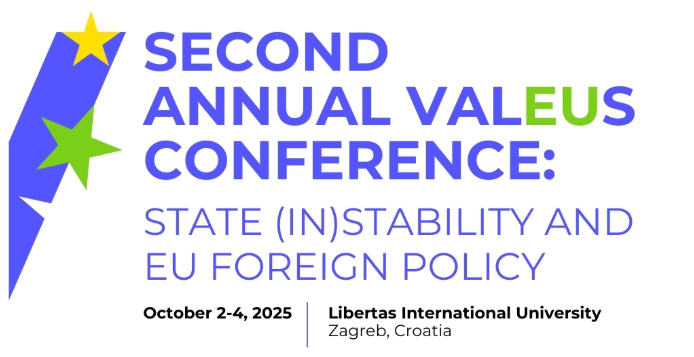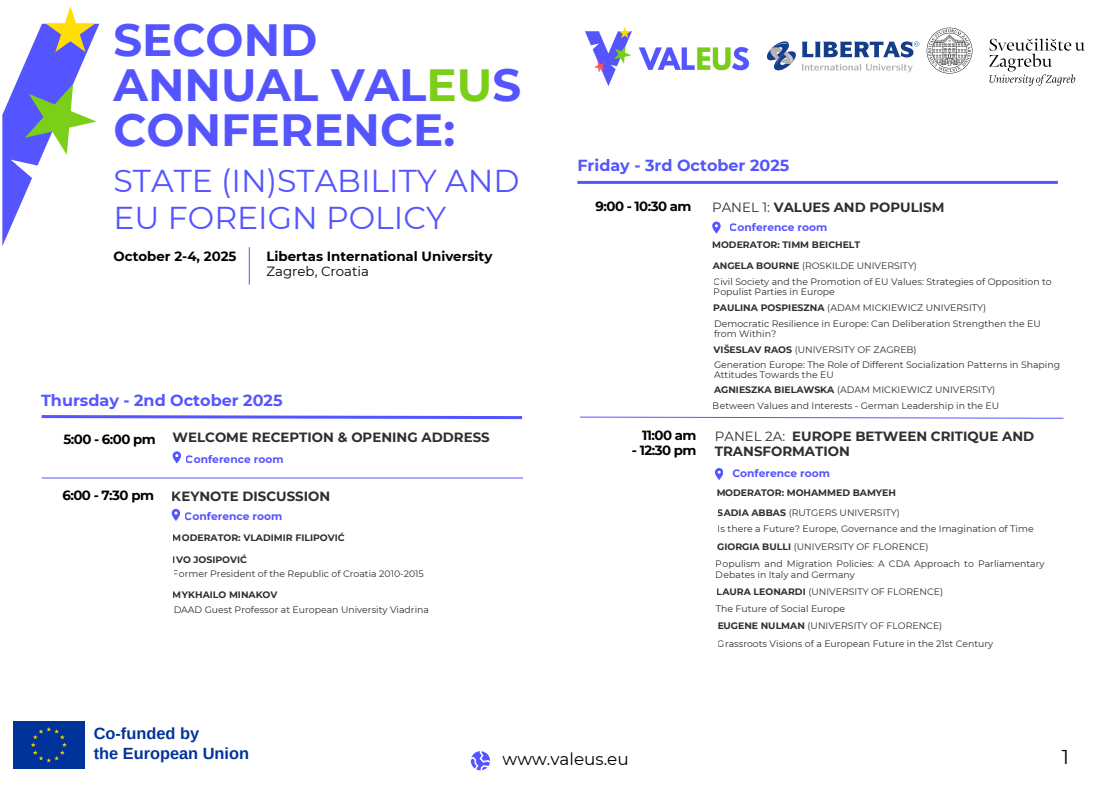
Second Annual ValEUs Conference: State (In)Stability and EU Foreign Policy
The ValEUs project will convene its Second Annual Conference, “State (In)Stability and EU Foreign Policy,” in Zagreb, Croatia, on 2–4 October 2025. Hosted by Libertas International University and the University of Zagreb, the event will gather international scholars to debate Europe’s values, instability, democracy, migration, and the EU’s place in global politics.
The conference will open on 2 October with a welcome reception and keynote dialogue featuring Ivo Josipović, former President of Croatia, and Mykhailo Minakov, DAAD Guest Professor at European University Viadrina, reflecting on European values and challenges of instability.
On 3 October, the programme begins with a panel on Values and Populism. Here, Angela Bourne will examine civil society strategies against populism, Paulina Pospieszna will discuss deliberation and democratic resilience, Višeslav Raos will analyse generational attitudes towards the EU, and Agnieszka Bielawska will explore Germany’s balance between values and interests.
Two mid-morning panels will follow. In Europe Between Critique and Transformation, Sadia Abbas, Giorgia Bulli, Laura Leonardi, and Eugene Nulman will address questions of governance, migration, social Europe and alternative visions of the EU. Simultaneously, in EU Foreign Policy and Geopolitics, Claske Vos will look at the realist turn in EU international relations, Beata Przybylska-Maszner will ask whether culture can counter foreign policy challenges, while Marta Zorko, Damir Mladić and Petar Popović will discuss the EU as a geopolitical actor and the future of multilateralism.
Afternoon sessions will widen the geographical scope. In Values of the EU and Critical Perspectives from Latin America, Ulrike Capdepón, Mariangela Rueda, Jorge Alberto Quevedo Flores, Silvana Insignares, and Jaime Antonio Preciado Coronado will reflect on human rights discourses, interconnectivity and Euro-Latin American relations. Running in parallel, EU Foreign Policy and Geopolitics will bring Ukrainian scholars Artem Lytovchenko, Dmytro Boiko, Ruslan Zaporozhchenko, Oksana Nekhaienko, and Iryna Shevchenko, who will debate European identity, borders, and Russia’s “empire of counter-values.”
The day will close with Critical Analysis of EU-Africa Development Policy. Ousseina Alidou, Mohammed Bamyeh, Zakia Salime, Randall Halle, Valeria Fargion, and Belinda Davis will critically address themes of climate justice, extractivism, migration, and the EU’s approach to Africa.
On 4 October, discussions will turn to migration and peripheries. In Third Countries and Migrations, Ayhan Kaya will present on Syrian refugees in Turkey, Jarosław Jańczak and Jakub Jakubowski will analyse electoral rhetoric on borders and migrants, while Driss Maghraoui and Christos Ziogas will explore contradictions in EU-MENA relations, alongside a contribution on India’s emergence as a global power.
The final sessions will run in two tracks. In EU Foreign Policy and the Periphery, Josip Lučev and Zdenko Babić will address post-socialist convergence, Amelie Kutter will analyse enlargement and peripherality, and Mirella Korzeniewska-Wiszniewska with Rafał Woźnica will discuss the external enforcement of EU values. In Promotion of EU Values, Zhanibek Arynov will present on EU digital diplomacy, Daniel Scarborough will discuss canon law and freedom of conscience under the Patriarchate of Moscow, and Lidija Kos-Stanišić, Borna Zgurić, and Đana Luša will share research on perceptions of European values in Central Asia.
The conference will conclude with a lunch and closing session on Saturday afternoon, bringing together insights from across panels.
With its diverse programme, the Zagreb conference will offer a comprehensive look at how the EU navigates instability, promotes values, and shapes its foreign policy in a turbulent world.
The full schedule is available here!




